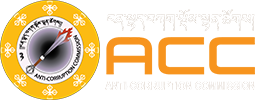- 1. Organizational integrity plan (OIP) and system
- 2. Business Integrity Initiative of Bhutan (BIIB)
- 3. Civil Society Organization/Media Integrity
To guide and empower the agencies in implementing robust integrity and anti-corruption measures, the National Integrity and Anti-Corruption Strategy (NIACS) 2019-2023 was developed through stakeholder consultations, serving as a comprehensive operational framework. Central to the execution of these measures is the Organizational Integrity Plan (OIP), a strategic tool designed for agencies to fulfill their obligations in addressing corruption. The OIP is not merely a procedural requirement; it is an essential component meant to be seamlessly integrated into the core organizational plans of each agency. This integration ensures a sense of ownership, emphasizing that integrity and anti-corruption efforts are not extraneous tasks but integral to the organizational mission.
The OIP undergoes periodic reviews to ensure its effective implementation, reinforcing its significance in the larger framework of corruption reduction. This process involves assessing the incorporation of OIP into key organizational plans, thereby affirming its relevance and impact. The annual review, conducted at the end of the financial year,evaluates the implementation status of each activity, guided by predetermined criteria and Means of Verification.
BIIB is a comprehensive program towards enhancing sustained ethical business practice in the country. It was initiated to promote corruption-free business by promoting a level playing field, providing equal opportunities, and addressing growing private sector distrust thereby promoting clean, honest, and trustworthy business transactions for the benefit of the companies, government, and the Nation as a whole.
To enhance greater collaboration with the CSOs in devising appropriate approaches to control corruption as well as promoting active citizenry engagement, the CSO and Media Engagement Programme was developed. Towards promoting constructive citizen engagement and participation at various stages of development activities/ programs, the ACC in collaboration with the Department of Local Government (DLG), Royal Institute of Management (RIM) and Bhutan Transparency Initiative (BTI) introduced social accountability tools.
